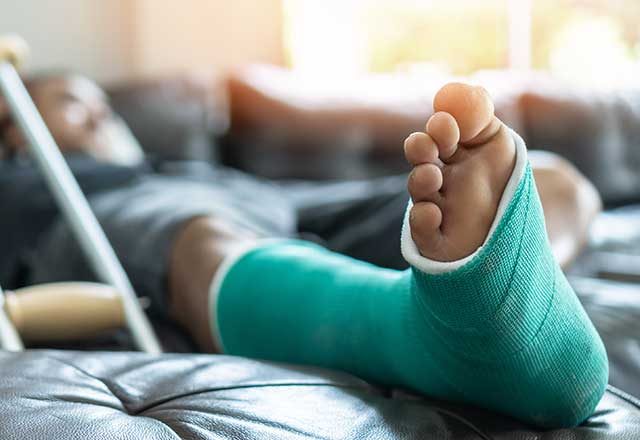I stood in the shower for the first time in months. No stool. No support. Hands pressed firm against the wall, I could feel the hot water running down my face and merging with tears that I could not hold back. After four months of relying on a shower stool and moving with just one leg, I felt a rush of emotions resurface all at once. After rupturing my Achilles tendon during my intern year of residency and undergoing multiple surgeries, I had finally reached this point — halfway through the first year of my internal medicine training. As I made my way back to working as a resident, I soon adapted to using a knee scooter at work and held the perspective of a real-life patient. The lessons I learned along the way shaped my view of medicine and how I interact with my own patients today.
Advise with encouragement
I vividly remember the worried, bewildered eyes as I would scoot down the hospital hallway on my knee scooter. The individuals who I felt best appreciated my condition were the ones who could empathize without introducing a repeated conversation regarding the origins of my misfortune. It reminded me that empathy is not a standardized, empty bag of words thrown to our patients to show care. Rather, it is an appreciation of what the individual has experienced and an awareness of where they are headed on their path to wellness or inevitable sickness. As I remember the eyes and smiles of those who connected with me in the subtlest way, I find myself sharing the following with my patients from the start: I see you, I hear you and I am here for you.
Put yourself in the shoes of the patient – Is the medical plan feasible?
There were days of my intern year when I spent any free moments frantically scheduling future appointments and physical therapy sessions. I learned that we, as caregivers, may unexpectedly introduce barriers for our patients as we seek to address every facet of their health. From complex medication regimens to the scheduling of various specialist encounters, these acts may inadvertently introduce reasons for our patients to give up prematurely. Optimal management may require us to investigate our patients’ barriers to health that may prevent medical adherence in the first place.
Each injury has its own grieving period
During my journey, my physical debilitation soon turned into a mental one. Months after my recovery started, I harbored the traumatic thoughts that brought on such emotion. Strong social support, counseling and mindfulness eventually helped me conquer this misery. I attempted to bring this newfound knowledge to my patients, but I soon learned these coping skills do not work for everyone. Rather, I learned to embrace the uniqueness of the social situations and obstacles each patient may face and tailor an approach to them. Let’s ensure our medical plans are actionable in the face of social barriers that pull our patients away from their ultimate goal: to feel better.
--
My injury opened my eyes to the lasting effect a physical handicap can place on an individual mentally, physically and socially. It has significantly changed my outlook and management of patients with injuries and disabilities. I have become a firm believer: The setbacks in life that may place us on knee scooters may often push us to evolve into something immeasurably better.
Full article published in: Stethos 2021 - Medical Humanities Journal of CCLCM
[themify_hr]
Related Content
- A Hand on Her Shoulder
- Quieted Voices – My Week at the Family Planning Clinic
- Fellowship Experience During a Pandemic
- A Gold Medal for Wellness
Want to read more from the Johns Hopkins School of Medicine? Subscribe to the Biomedical Odyssey blog and receive new posts directly in your inbox.
